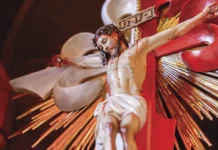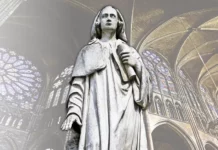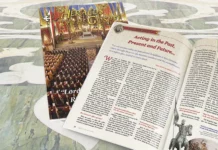What is the basis for the constancy of the Saints, which gives them confidence amid disaster and detachment in triumph? The response comes from Him who on Calvary was not afraid to confront failure.
Those who like to closely observe the people they encounter throughout life have undoubtedly been enchanted to perceive the diversity of souls, the variety of temperaments and the surprising array of characteristics with which the Good God had endowed human beings, making each one, from a certain perspective, unique, unrepeatable and supreme.
One thing, however, seems to be a constant in all of the sons and daughters of Adam, and that is inconstancy.
Capable of swift and radical changes
In Brazil, the four seasons are never very well defined. It is not uncommon to experience all of them in a given day: a wintry dawn, an autumn morning, a summer afternoon and a springtime evening…
At times, daybreak is radiant, without any indication of what is to come – a torrential rainstorm with lightning and thunder in the late afternoon. On other occasions, the contrary happens: the day starts gloomy, overcast and grey, but this gives way to an evening of hope, painted with the brilliant hues of a conquering sun.
We could say that souls are also like this, capable of swift and radical change. They awaken optimistic and joyful, smiling at life; a few hours later, their outlook is precisely the opposite: disappointment, sadness and despair. “Lows” and “highs” that can be very abrupt are common, especially among those who trust in themselves, depending on whether they meet with adversity or are successful in a given situation or undertaking.
This reality of our nature suggests a question: is it possible for a person to remain ever the same, and not to give in to so many variations? We soon come to the surprising conclusion that it is impossible to remain constantly stable in all aspects, for a sleepless night or an illness are enough to physically change the “climatic conditions” of our soul.
Furthermore, for a person to strive to remain unalterable throughout his entire life would not be the most perfect way, for this was not how God proceeded with the work of creation. Throughout the course of life, one must experience change; there must be dawns, sunsets and middays.
Where, then, is constancy to be found on this earth?
The rock upon which the constancy of the Saints is founded
The Sacred Heart of Jesus, Supreme Founder of serene and innocent souls, gave a perfect and complete solution to this problem with the metaphor of the prudent man, who built his house on rock: “the rain fell, and the floods came, and the winds blew and beat upon that house, but it did not fall, because it had been founded on the rock” (Mt 7:25).
Yes, it is true that everything changes; there are storms, floods and hurricanes, but there is a rock, an unseen foundation that remains unchanged and serves as the basis for the constancy of the Saints!
Despite the variety of souls and the diversity of the designs of Providence, there is a foundation which cannot be substituted and which God demands of everyone: the willingness to face humiliation, rejection, and scorn for His name. Briefly put, the readiness to fail!
So necessary did this interior attitude become for fallen human nature that the Man par excellence – despite being hypostatically united to God – experienced the sentiment of failure. The Son of the Most High, to whom the Lord gave the throne of His father David (cf. Lk 1:31), had to undergo distressing humiliations, suffer the most cruel torments and die in the most infamous manner, between two criminals.
Nevertheless, this rock, whose birth name is “readiness to fail,” upon being baptized in the Blood of Christ, became a solid support for humanity in this valley of tears. The supreme and apparent defeat of Jesus robed the Cross in the purest and must refulgent light that can be found on earth.

It is impossible to attain sanctity without the cross
It is because we do not build our house on this rock that the periods of fervour in our spiritual life – filled with ideals and excellent ideas – are followed by tragic periods, in which we have the sensation of interior collapse, just like the house that the foolish man built on sand: “it fell; and great was the fall of it” (Mt 7:27).
If we were to seek the causes for such radical turnabouts, it is probable that we would discover within ourselves a great desire to “do well,” to succeed in our undertakings, to be seen as successful in the estimation of others, or perhaps only in our own eyes. In other words, we would see that we have tried to climb many mountains, except the one that we are called to scale, that of Calvary.
There is only one way of obtaining constancy of spirit, and that is by convincing ourselves that it is impossible to attain sanctity without the cross.
In the life of every holy person, there were humiliations, obstacles, misunderstandings, ingratitude, calumnies, sorrows, perplexities and “dead ends.” They bore all of these difficulties, meekly striking their breast, thanking God for their trials, pardoning those who offended them, showing concern for others, humbling themselves and recognizing that they deserved even worse!
“Come abide in my Heart”
Therefore, if we wish to maintain unshakeable equanimity of soul in every circumstance, it is not enough to dwell on the poetic considerations suggested by the parable of the rock. We must be aware, above all, that this rock has a name: readiness to fail in any of our undertakings on this earth.
Souls that acknowledge their frailty in face of difficulties, humbly submitting to the divine plans and accepting every misfortune and defeat that Providence wishes to send them, move the Immaculate Heart of Mary, who draws them close to Herself, saying: “Come abide in my Heart, where every failure is transformed into victory!” ◊






